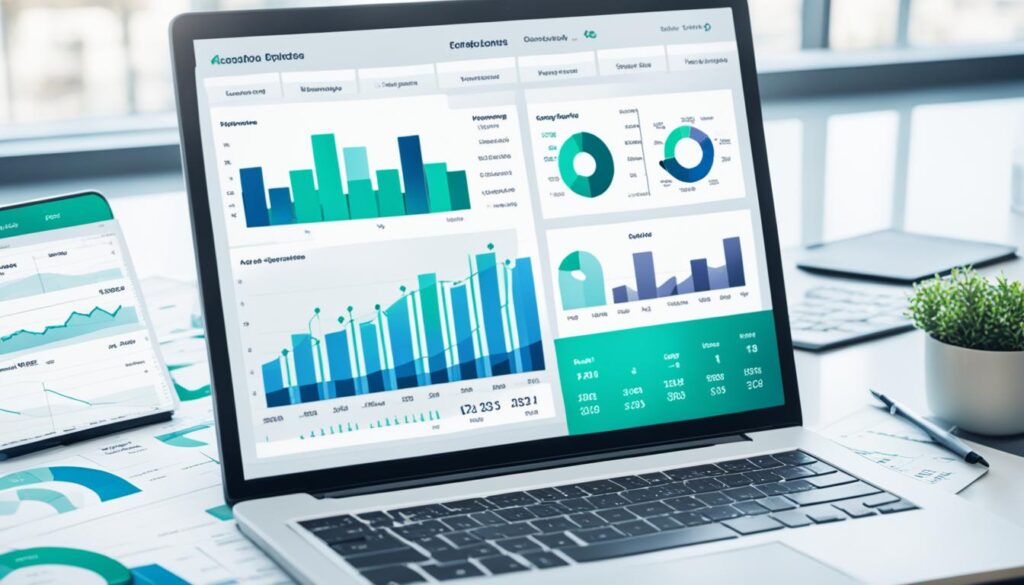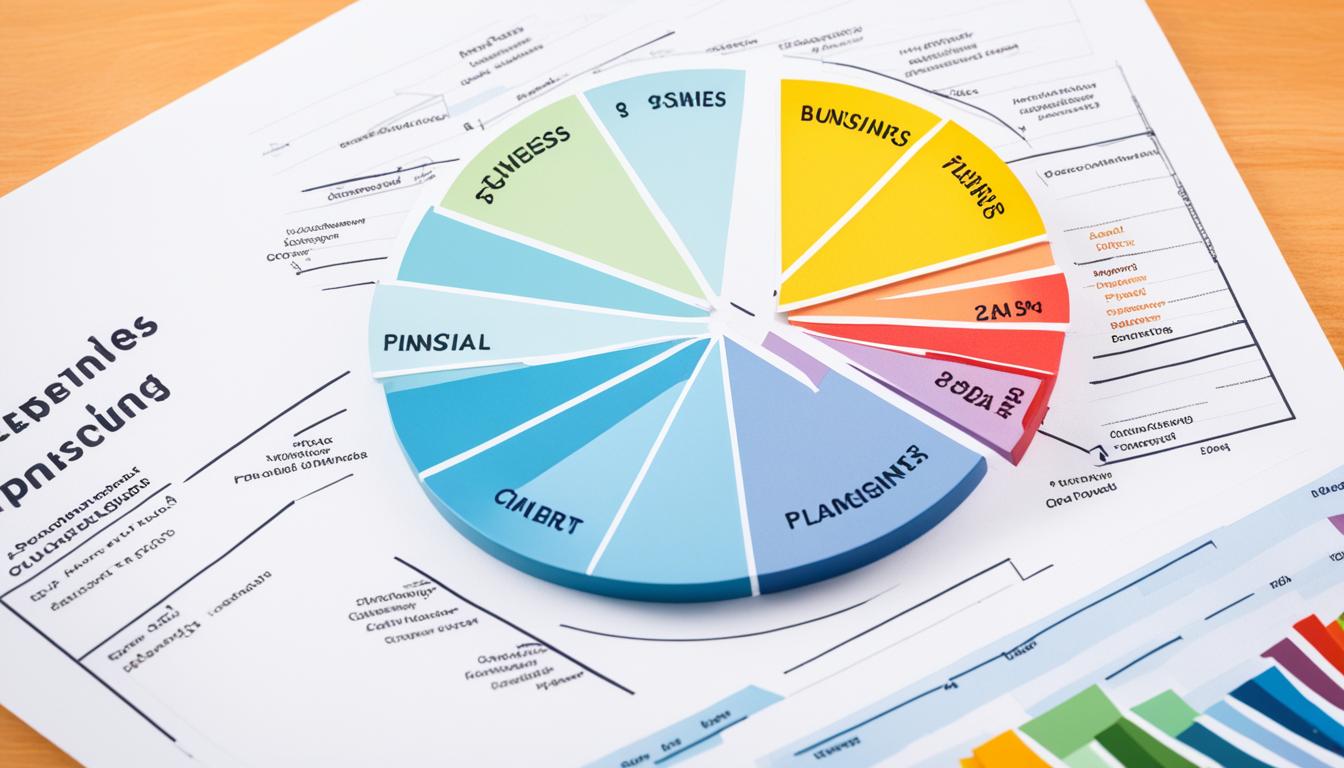Starting a business takes more than a great idea. You need solid financial planning. A detailed business budget is crucial for any small business owner. It’s not just good to have; it’s essential for steady growth and small business accounting. A strong startup budgeting plan helps you predict and monitor your financial outcomes. This turns your dreams into real financial achievements.
Building a budget for your business may seem tough, but it’s achievable. By simplifying the process into smaller steps, you can master your finances. This guide will show you how to organize and evaluate your money flow. It helps you create a budget to guide your business to success. For more information and resources, check out Bench Accounting.
Key Takeaways
- Creating a budget is key for small business accounting and financial planning.
- A well-planned business budget aids in startup budgeting, improving financial insight.
- Accessing effective tools, like budget templates, provides a structure for managing finances.
- Comparing financial outcomes with budget expectations allows for smart spending adjustments.
- Knowing the difference between fixed and variable costs keeps your business flexible.
- Accounting software gives a full view of your financial progress and budget adherence.
- Periodically reviewing and tweaking the budget helps your financial strategy grow with your business.
Understanding the Importance of a Business Budget
A financial management strategy shows true colors when we talk about a business budget’s value. It’s more than just numbers on paper. A well-planned business budget acts as a guide for businesses to manage money and increase profits.
Defining a Business Budget
A business budget combines all expected costs and income. It acts like a roadmap helping businesses avoid debt and make a profit. This roadmap covers profits, money flow, and costs for a set time. By setting financial targets early, it aids in smart decision-making and efficient use of resources.
The Role of a Budget in Financial Management
Good budgeting is key to strong financial health. It makes sure spending aligns with financial goals, encouraging discipline. A budget also helps identify where costs can be cut. This is vital for keeping a healthy financial status and strong money flow.
Maximizing Profits Through Effective Budgeting
The main aim of budgeting is boosting profits. This means not just reducing unwanted spending but also improving how the business earns. A budget makes businesses look closely at money coming in and out. This helps prioritize profitable activities and reduce losses.
| Type of Expense | Examples | Type of Cost |
|---|---|---|
| Fixed Costs | Debt repayment, employee salaries, depreciation of assets, property taxes | Constant |
| Variable Costs | Hourly wages, utility costs, raw materials | Fluctuating |
This financial summary helps businesses plan for slower months with strong cash flow management. Also, adopting newer budgeting methods like performance-based or value proposition budgeting boosts financial strategies.
In the end, the value of a business budget is huge. It not only helps with everyday financial management but also supports long-term financial health and profit maximization.
Gathering Your Financial Data
When building a solid financial base, small business owners should first assess their financial history and resources. It’s crucial to understand both past finances and the current situation. This helps in creating a budget that forecasts and improves financial health.
Reviewing Past Performance
Looking back at financial performance is key. It involves examining past data to spot trends, evaluate budgeting success, and see how things like inflation affect the business. 73% of small business owners worry about inflation, highlighting the need for adaptable budgeting strategies.
Identifying Revenue Outlets
Improving cash flow means finding different ways to earn money. This includes looking at income from sales, services, or investments. Strategies to boost profitable areas and improve weak ones are essential. Activity-based budgeting can help by connecting spending to revenue outcomes.
Documenting Fixed and Variable Expenses
Knowing the difference between fixed and variable costs is vital for budgeting. Fixed expenses, like rent and salaries, don’t change with business activity. Variable expenses, such as materials, change with the level of business. Using past budget data to forecast changes can make predictions more accurate.
| Budgeting Approach | Description | Utilization |
|---|---|---|
| Incremental Budgeting | Adjusts current budgets based on incremental cost increases. | Ideal for stable, predictable environments. |
| Zero-Based Budgeting | Every expense must be justified for each new period. | Suitable for aligning spending tightly with current business goals. |
| Activity-Based Budgeting | Links spending to specific activities that drive revenue. | Effective in managing cost drivers and enhancing operational efficiencies. |
| Participative Budgeting | Involves various management levels in the budget creation process. | Promotes accountability and inclusivity throughout the organization. |
Enhancing a business’s financial strategy requires detailed expense tracking and cash flow management. By carefully analyzing financial data, owners can build budgets that survive economic changes. This leads to longer-term financial growth and strength.
![]()
Small Business Budgeting Tips
For small businesses, making a budget is very important for staying financially stable and growing. Using cost reduction strategies and budgeting software helps a lot. Knowing and using some key tips can lead to saving money without lowering what you offer.
It’s essential for businesses to watch all expenses, fixed and variable, to spot where they can save. This means carefully listing every cost, including rent, salaries, and even small things like office supplies. Using budgeting software makes it easier to keep track of finances. This gives a clear view of money coming in and going out.
- Regularly checking finances to update budgets as business and market change.
- Getting employees involved in budgeting improves commitment and provides realistic insights, improving cost savings.
- Keeping personal and business finances separate simplifies taxes and gives a clear view of the business’s health.
| Aspect | Importance |
|---|---|
| Expense Tracking | Helps in finding areas to cut costs without losing quality. |
| Regular Budget Review | Makes sure the budget matches real business situations and abilities. |
| Employee Involvement | Offers different views on saving money and avoiding budget mistakes. |
| Separation of Finances | Avoids confusion and keeps business money matters clear and straightforward. |
It’s key for business owners to pay themselves in the budget. It ensures they have income and shows the true cost of running the business. Also, keeping personal and business money separate helps with taxes and understanding your finances better.
Using cost reduction strategies means you should often check and update your budget. Changes in finances, growth, and the market should be reflected. Budgeting software helps by providing current data for better decisions.

Planning for growth and unexpected costs is also vital. This way, businesses can face surprises without money worries. Businesses should plan for now and the future, ready for any economic shifts.
Effectively managing a small business budget means balancing tracking expenses, expecting financial changes, and adjusting budgets to business goals. Budgeting software and cost reduction strategies are crucial for keeping this balance.
Projecting Future Cash Flow
For small business owners, projecting cash flow is more than counting numbers. It secures their future growth. Managing cash wisely helps them through ups and downs. By predicting what they’ll earn and spend, they can make smart choices. Weekly cash flow forecasts are common. Yet, year-long forecasts need regular updates to stay true to financial changes.
Estimating Upcoming Revenue
Good forecasting starts with estimating future income realistically. Not just steady money, but also changing amounts like tax refunds. Sales might be regular, but they must consider the economy and market needs. Keeping forecasts current is vital, helping everything from local firms to tech startups make solid plans.
Calculating Estimated Expenditures
Along with guessing income, figuring out upcoming costs is key. Small business software helps track stable and changing expenses. Since spending impacts financial health, forecasts should cover unexpected costs too. Being cautious and planning for surprises keeps finances safe.
Adjusting for Seasonal Fluctuations
Seasonal market changes are critical to grasp. Budgets need adjusting for these shifts. A shop might sell more during holidays, requiring more stock earlier. Staying flexible and using up-to-date data helps. This way, businesses stay financially healthy, even in tough times.
In the end, careful Cash Flow Management leads to success. Forecasting lets business owners catch problems early and adjust. This proactive stance is key to avoiding financial setbacks.
FAQ
What are the first steps in creating a budget for my small business?
What is a business budget, and why is it important?
How does effective budgeting contribute to maximizing profits?
How can I review past performance effectively when budgeting?
What’s the difference between fixed and variable expenses, and why does it matter?
What cost reduction strategies can small businesses implement to improve their budget?
How can I accurately project my business’s cash flow for the upcoming year?
Source Links
- 6 Steps To Create A Budget For Your Small Business – https://fibrecu.com/create-budget-small-business/
- How to Create a Business Budget for Your Small Business | Zoho Books – https://www.zoho.com/books/academy/financial-management/how-to-create-a-realistic-business-budget.html
- How to Create a Business Budget: 6 Simple Steps – NerdWallet – https://www.nerdwallet.com/article/small-business/how-to-create-a-business-budget
- 6 Steps to a Better Business Budget – https://www.investopedia.com/articles/pf/08/small-business-budget.asp
- Why Is Budgeting Important in Business? 5 Reasons – https://online.hbs.edu/blog/post/importance-of-budgeting-in-business
- How to Create a Business Budget – https://business.bankofamerica.com/resources/don-t-fear-the-b-word-how-budgets-can-liberate-your-business.html
- Mastering the Art of Budgeting: A Small Business’s Path to Financial Success – https://www.linkedin.com/pulse/mastering-art-budgeting-small-businesss-path-success-karen-van-zyl
- How to Budget for Your Small Business – https://www.businessnewsdaily.com/8323-small-business-budget.html
- 7 Budgeting Basics for Small Business Owners – https://www.score.org/resource/blog-post/7-budgeting-basics-small-business-owners
- How to Create a Cash Flow Projection – https://www.fool.com/the-ascent/small-business/accounting/cash-flow-projection/
- Preparing a cash flow forecast: Simple steps for vital insight – https://www.pwc.com/gx/en/services/entrepreneurial-private-business/small-business-solutions/blogs/preparing-a-cash-flow-forecast-simple-steps-for-vital-insight.html
- How do you create a realistic budget and cash flow projection? – https://www.linkedin.com/advice/0/how-do-you-create-realistic-budget-cash-flow-projection


